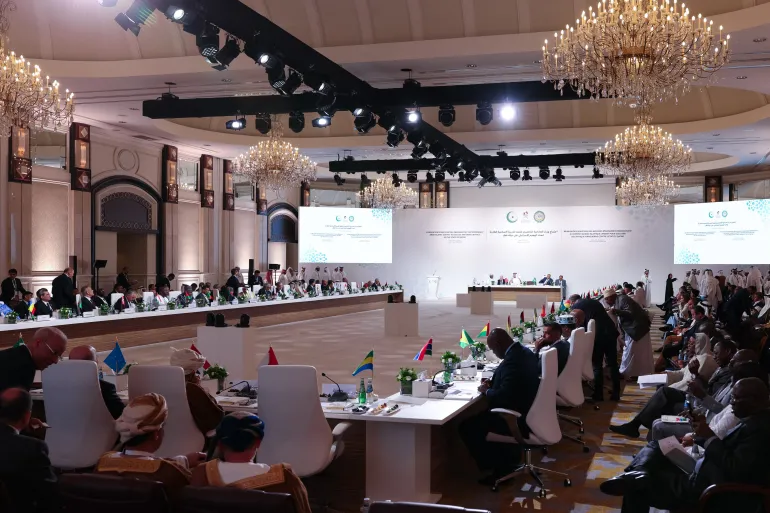By admin
Copyright dawatmedia24

By targeting the Hamas negotiating delegation on Qatari soil, Israel did not only violate Qatar’s sovereignty, international law and the laws of war — it placed the entire region at a delicate historical crossroads. Either this brazen aggression will become an opportunity to stop the extermination in Gaza and the wider regional assault, or it will embolden Netanyahu and his government to further rampage across the region.
No limits to the aggression
After absorbing the huge shock of the “Al-Aqsa Flood” operation, Israel quickly built a new security and strategic apparatus in Palestine and the region. This was voiced by several officials and then crystallized in its aggressive policies.
Israel came to see itself facing an existential danger after the collapse of its previous security system based on deterrence. It saw before it a “historic opportunity” that might not recur to resolve the Palestinian question once and for all, then to confront all current, future and potential enemies and rivals — pursuing a policy of savage, bloody revenge on one hand, and reshaping popular consciousness to get past the moment of the Flood on the other.
From the first days of the assault, the principle of assassinating Hamas’s military, political and governmental leaders became a central pillar of Israel’s war. If it could eliminate most of the first-tier political and military leaders in Gaza, leaders of Hamas outside Palestine would still pose a challenge due to the operational risks of failure on the one hand and the political cost on the other.
Israel declared the entire external leadership of Hamas to be on assassination lists. It then moved to implementation: it assassinated the deputy head of its political bureau, Saleh al-Arouri, in Beirut, then its head, Ismail Haniyeh, in Tehran.
It also assassinated first-tier military and political leadership within Hezbollah — chief among them Secretary-General Sayyid Hassan Nasrallah — and targeted a large number of Iranian military and political leaders during its confrontation with Iran. It also assassinated the Prime Minister of the Sanaa government, Ahmad Ghalib al-Rahwi, along with several of his ministers.
Although everyone knew Israel would not miss any opportunity to complete the “mission,” the presence of most of these leaders in Qatar and Turkey presented a major challenge given the political costs: the two countries’ relations with the United States and other factors. Thus it was expected that security gaps would be exploited for “quiet” assassinations without direct claim of responsibility. But Netanyahu and his military and security leadership chose a different course.
Qatar was, theoretically and relatively, one of the safest and most secure places against any aggression. It is not in direct confrontation with Israel (even though Israel repeatedly tried to incite against it), it does not share a border with occupied Palestine, and it is under the American umbrella in the Arabian Gulf. Qatar enjoys good relations with Washington and is a main mediator in ceasefire negotiations.
Israel threw all of the above to the wind and targeted the negotiating delegation that was discussing an American proposal for a ceasefire. It then brazenly claimed responsibility for the operation before its results were even clear — unlike its earlier restraint in publicly claiming responsibility for the assassinations of al-Arouri and Haniyeh, even though those took place on “hostile soil.”
In simple logic as well as strategic reasoning, when you target the safest place, you are sending a message to everyone that they are targeted and under fire without exception.
This message was reinforced by Knesset Speaker Amichai (Amir) Ohana when he posted footage of the strike on Qatar on X, commenting that it was “a message to the whole Middle East.”
Netanyahu did not appear remorseful for what was done; rather, he called on countries that host Hamas leaders (whom he called terrorists) to expel them or hand them over to justice, warning that “if they do not, we will do it ourselves” — a threatening message to all.
The targeting of Hamas leadership in Doha represents the apex of Israeli recklessness in the region in terms of political cost, but it also signals continuity: the next step could be a repeat attempt in Qatar and/or targeting Hamas and Palestinian resistance leaders in other countries such as Egypt and Turkey, and/or direct strikes on other states in the region under any pretext deemed part of the new Israeli national-security paradigm — regardless of whether Palestinian leaders are present on their soil.
Here it must be recalled that the likelihood of repeated aggression against Lebanon, Iran and Yemen remains very high, given the results of previous confrontations and recent developments in those three countries. The hot competition with Turkey in Syria also suggests the potential for that rivalry to become an indirect, or even direct, confrontation.
Israel’s regional approach is no longer constrained by any political or strategic rationale. It is also useful to note the clear American complicity in the recent strike, despite later attempts by the (Trump) administration to distance itself.
Turning the crisis into an opportunity
Despite all the above, this severe crisis and challenge can be turned into a real opportunity to stop the extermination in Gaza and the aggression across the region — especially because this reckless unmooring from any rational restraint stems from an impulsive, not a confidently victorious, psychology. A truly confident victor does not commit such folly; it is the arrogance of perceived power and intoxication with imagined capability.
International reactions to the violation of Qatari sovereignty were swift, sharp and direct, even from those who normally do not object to targeting resistance leaders. Qatar is a key mediator in negotiations, a Gulf state with security and defense ties to Washington, and it has substantial relations and investments with most countries, particularly Western ones.
The American attempt to distance itself from the attack was notable, though not convincing. Add to that the failure to assassinate many of Hamas’s leaders, which increases internal pressure on Netanyahu and his government — whether from public opinion or from military leadership that views the large ground operation in Gaza as an exhaustion of the army.
Here lies a real, practical, and achievable opportunity to stop the war. Israel should be punished for what it has done and made to pay a real price for the recent aggression; otherwise, what comes next for the whole region will be worse.
The response must be strong, not symbolic; practical, not rhetorical; collective, not individual. It should be rooted in self-defense, not simply solidarity with Palestine or Qatar.
There are actions that states can and should take individually, and there are collective measures that should be taken. Qatar together with Egypt can announce the suspension of the negotiation track that Israel killed with the planes that struck the negotiating delegation in Doha, and decisively affirm they will not return to that track except with a clear Israeli commitment and a public American guarantee to stop the war rather than stalling and buying time.
The Gulf states collectively can deliver a clear, firm message to the (Trump) administration demanding real pressure on Netanyahu and “Israel” to stop the war, while threatening to reconsider Gulf–U.S. relations — including investments, agreements and many shared interests in the region — which the administration would not want to jeopardize.
Doha summit: a last chance?
In this context, the extraordinary importance of the Arab summit to be hosted by Qatar emerges. Because previous Arab and Islamic summits on Gaza stopped at declarations and unenforced decisions, and because Israel has broken every limit of reason and crossed all red lines while still enjoying full American cover, the Doha summit could be the last opportunity to rein in Israeli aggression in Gaza and the region by sending a powerful message of pressure and taking practical steps toward both Tel Aviv and Washington that continued aggression will no longer be tolerated nor go unpunished.
Some measures the Arab summit should adopt for immediate implementation:
First, all relations with the occupying aggressor state should be suspended politically, economically, commercially, and security-wise in all fields — including expelling ambassadors, withdrawing from Abraham Accords agreements, closing the skies to all Israeli aircraft or aircraft heading to Israel, and preventing any ships bound for it from passing, regardless of nationality or cargo — etc.
Second, there is a real chance today to make up for past failures and use the current international posture to break the blockade on the Gaza Strip and bring in basic necessities — not only as a humanitarian obligation but also as a strategic assessment that Gaza is, in practice not just rhetoric, a bulwark and defensive barrier for the Arab and Islamic worlds.
Third, accelerate and deepen legal steps to criminalize and hold the occupying state and its leaders accountable before the International Court of Justice and the International Criminal Court, and begin practical measures to expel it from the United Nations.
Fourth, work on rethinking the region’s security and defense systems, especially those linked to the United States — starting with cooperation and integration among regional states, diversifying sources of weaponry, and moving toward long-term self-protection.
The great sin of both Napoleon and Hitler was their excessive confidence in the strength of their armies and their overwhelming superiority over their enemies, which pushed them to open many fronts larger than they could control and subjugate for long — the height of expansion became the beginning of retreat for both, each in his own time and circumstances.
Conversely, Britain’s and Europe’s policy of appeasement toward Hitler before World War II, granting him the Sudetenland in Czechoslovakia, read by Hitler as weakness and hesitation, encouraged him to invade all of Europe. In contrast, the decision to enter the war after the occupation of Belgium and the multiplicity of fronts against him were factors in his defeat.
Although literal historical analogies are not exact, their lessons remain present. Today there is a real opportunity to turn Israel’s and Netanyahu’s hubris into a setback so that the peak of arrogance becomes the start of decline.
But this requires an accurate reading of the post-October 7 era in Israel and the region, a strategic vision for change, and the political will to confront before being exposed to a new aggression — from every country in the region on both the individual and the collective levels.
Today the Arab and Islamic worlds stand before the stark and harsh realities of the “Greater Israel” project: the targeting, weakening, division, and perhaps occupation of many of their states. They therefore face a historical crossroads and must choose between acting to stop the extermination and aggression, or waiting for violations to expand into a wholesale desecration of the region.



